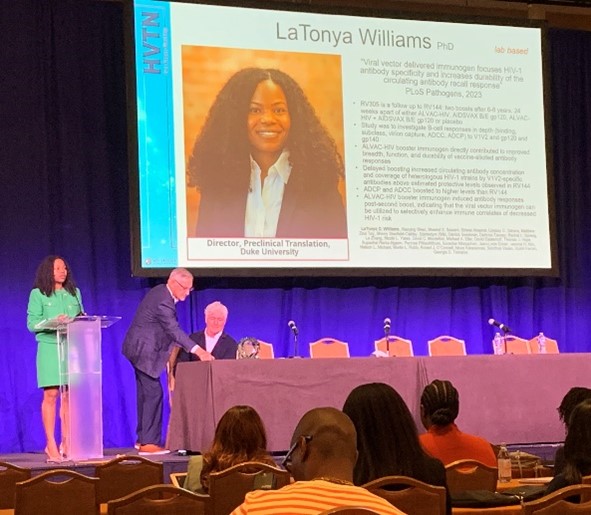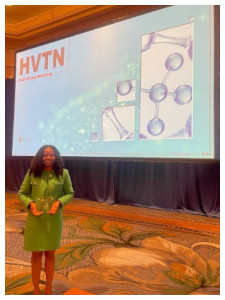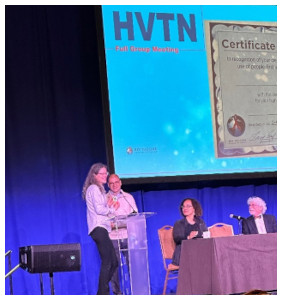The 2024 Full Group Meeting of the HIV Vaccine Trials Network (HVTN) took place May 1-3, 2024 in Washington, D.C. The conference is attended by HVTN Network PIs, staff, and invited guests from all over the world. Every year at the Full Group Meeting (FGM), HVTN Leadership presents awards to recognize clinical site staff and affiliated individuals who have made significant contributions to the Network.

 LaTonya Williams, PhD received the 2024 HVTN Bonnie Mathieson Young Investigator Award for her outstanding publication and discovery of how vaccines can tune antibody specificities. The article, "Viral vector delivered immunogen focuses HIV-1 antibody specificity and increases durability of the circulating antibody recall response" was published in PLoS Pathogens. The Bonnie Mathieson Young Investigator Award is presented annually to recognize young investigators who have published an outstanding first author, co-first author, or senior author paper with the HVTN in the previous year. The award was established to recognize young investigators in honor of Bonnie Mathieson and her unrelenting contributions to the HVTN and dedication to HIV vaccine research
LaTonya Williams, PhD received the 2024 HVTN Bonnie Mathieson Young Investigator Award for her outstanding publication and discovery of how vaccines can tune antibody specificities. The article, "Viral vector delivered immunogen focuses HIV-1 antibody specificity and increases durability of the circulating antibody recall response" was published in PLoS Pathogens. The Bonnie Mathieson Young Investigator Award is presented annually to recognize young investigators who have published an outstanding first author, co-first author, or senior author paper with the HVTN in the previous year. The award was established to recognize young investigators in honor of Bonnie Mathieson and her unrelenting contributions to the HVTN and dedication to HIV vaccine research
Justin Pollara, PhD received an award in recognition of his exceptional scientific communication skills and commitment to using people-first language. His talk, “IgG and Fc receptor genetic variation associates with functional antibody responses in HVTN108”, described a recent study performed in his lab to address a common observation that people respond differently when given the same vaccine. Across a population it is normal to see vaccine responses that range from negative or no response to very robust and strong responses. The reasons for these differences are not completely known. Dr. Pollara and his collaborators found that natural diversity in genes that encode antibodies and antibody receptors can impact how strongly a person responds to a vaccine. This research helps to improve understanding of why a vaccine works better for some and could be used to identify those who may benefit from modified vaccines or more boosts.
 The award received by Dr. Pollara is part of the HVTN’s ongoing efforts to enhance scientific communication within the network, with the end goals of 1) being inclusive and respectful of the diverse members of the Network and 2) maximizing impact and sharing successes with the broader community. A collaborative working group of community representatives and HVTN investigators from various disciplines—clinical, basic, biostatistical, and social and behavioral sciences— provided resources for presenters to support clear communication. The award was established to highlight and honor exemplary communication, a crucial skill in advancing HVTN’s advocacy for vaccines and prevention strategies, particularly in the context of HIV research. As you reflect on this goal within your own work, consider exploring our Communication Tips and Resources on the CFAR website or scheduling a CFAR consult for additional support.
The award received by Dr. Pollara is part of the HVTN’s ongoing efforts to enhance scientific communication within the network, with the end goals of 1) being inclusive and respectful of the diverse members of the Network and 2) maximizing impact and sharing successes with the broader community. A collaborative working group of community representatives and HVTN investigators from various disciplines—clinical, basic, biostatistical, and social and behavioral sciences— provided resources for presenters to support clear communication. The award was established to highlight and honor exemplary communication, a crucial skill in advancing HVTN’s advocacy for vaccines and prevention strategies, particularly in the context of HIV research. As you reflect on this goal within your own work, consider exploring our Communication Tips and Resources on the CFAR website or scheduling a CFAR consult for additional support.